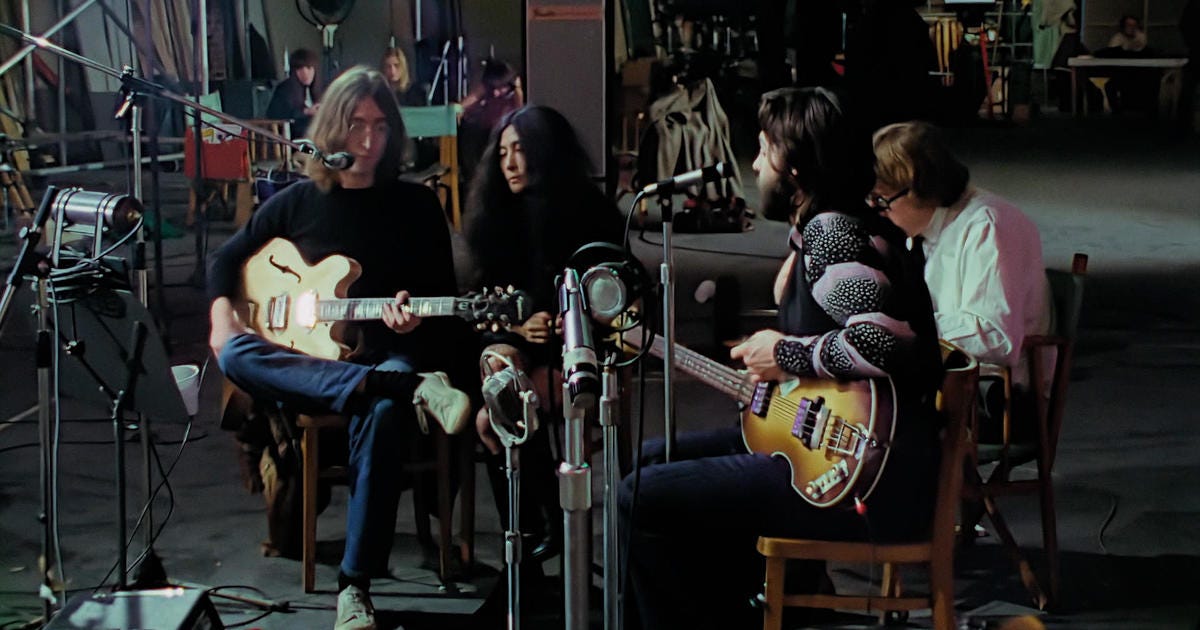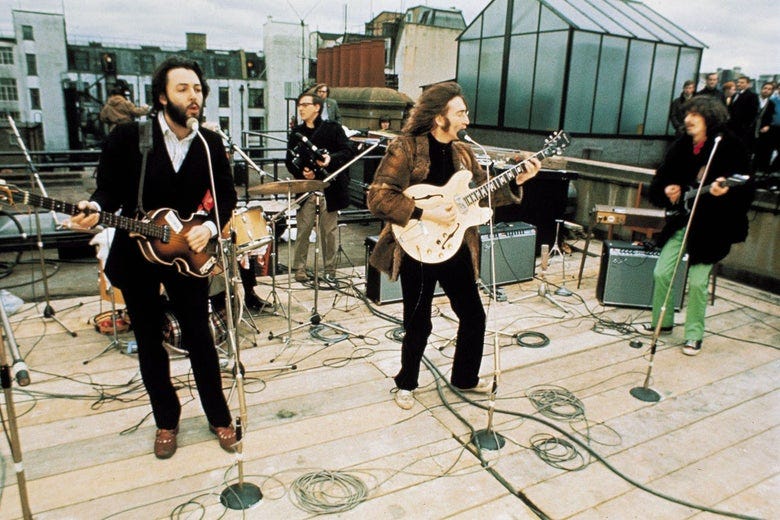Get Back
How an 8-hour Beatles documentary reconnected me with my childhood love for the band
My first thought when I heard there was a new 8-hour documentary about the Beatles was, “I am never going to watch that.” Not because I dislike the Beatles, but because I was so obsessed with the band as a child that I could no longer stand to listen to them.
Like many people in their 20s, I first heard their music from my parents, who owned the red-and-yellow 1 compilation of the band’s number-one hits. As soon as I played the CD for the first time, I was hooked. From then on, all I did was listen to the Beatles, read about the Beatles and wear Beatles t-shirts. I named my pet mouse Lucy In The Sky With Diamonds. When I visited New York City with my family, I left a poem for John Lennon at the Imagine mosaic in Central Park.
Things shifted, however, during my teenage years. I became interested in punk and promptly switched my allegiance to the more abrasive Ramones and Sex Pistols. I didn’t believe that love was all you needed anymore; I believed in anarchy and power chords. I cast the Beatles aside. The band was for beginners, loved only by the masses. For the decade-plus that followed, I rarely thought about the band and when I did, I rolled my eyes. “The Beatles,” I thought. “How basic.”
Still, the boredom of staying entertained during a never-ending pandemic gets the best of even the most jaded. One night, I decided to put on Peter Jackson’s recently released The Beatles: Get Back, an 8-hour documentary mini-series that follows the group in January 1969 while they recorded Let It Be, their final album.
While I expected to watch half an hour and turn it off, instead, I was utterly transfixed. My old love for the band came flooding back, filling me up with lyrics I thought I’d long since forgotten. There were my old friends, the men who wrote the soundtrack of my childhood: John, Paul, Ringo and George.
Get Back was originally intended to be a TV special directed by Michael Lindsay-Hogg, who also created the promotional clip for “Hey Jude.” The clip had been so successful that Lindsay-Hogg was rehired, this time to make a feature-length special of the band performing their latest album in front of an audience.
Over 60 hours of video and 150 hours of audio were recorded for the project. However, members of the band who saw a rough cut of the film weren’t keen on having the groups’ dirty laundry aired so publicly. Half a century later, however, the footage feels like an absolute treasure, documenting the Beatles in what would be their final year together.
While the internal disagreements and band drama are juicy to watch, the strongest part of the documentary is the unfiltered depiction of the Beatles' songwriting process. During these sessions, the group wrote the songs that make up their final albums, Abbey Road and Let It Be, two of the strongest in their entire catalogue. It’s surreal to watch the band summon the songs out of thin air, iconic tracks that have been the soundtrack to so many lives. This true strength of the documentary reminded me why I loved the Beatles so much as a kid: they wrote absolutely magical songs.
Regardless of how you feel about the band personally, it’s inarguable their songwriting changed the landscape of rock and pop forever. It’s extraordinary to watch McCartney sit on a stool, bass in hand, and come up with the main riff of “Get Back”. It’s incredible to watch Harrison, who was uncredited on the track, help Starr write “Octopus’s Garden” in the studio.
There’s also many songs the group work on that the Beatles don’t record, but that the members later release on solo albums. It’s wild to hear Harrison play early fragments of songs he’d release on his solo album, All Things Must Pass, only a year later. It's unreal to watch Lennon present a song to the band he then called “On The Road to Marakkesh,” a song that he’d later release on his 1971 album Imagine as “Jealous Guy,” one of his most-covered songs of all-time.
Unfortunately, Lennon was the most difficult figure for me to revisit. As a young girl, John was always my favourite Beatle. To me, he was not only the true creative spark of the band, but he had the best voice. Some of my favourite Beatles songs feature his hollering rock’n’roll rasp, whether on the band’s 1963 take on “Twist And Shout” or on Let It Be’s “Dig A Pony.” I drew cartoon portraits of him and tacked them to the walls of my bedroom, proud that I had picked him as my number one.
Nowadays, it’s well-known that Lennon was physically and emotionally abusive towards his first wife Cynthia, and their son, Julian. In a 1980 article with Playboy, he admitted that the song “Getting Better” was autobiographical and that he frequently hit the women he dated when he was younger. As well, it’s now known that Lennon forced his second wife, Yoko Ono, to accompany him everywhere, behaviour that sparked the decades-long rumour that Ono was responsible for the Beatles’ break-up.
Ono’s constant presence by Lennon’s side is a deeply uncomfortable part of Get Back. While Linda McCartney and Maureen Starr visit their husbands regularly, Ono is a constant presence in the studio, often sitting right next to Lennon while the group writes music together. She even stays by his side while they record, behaviour that is virtually unheard of. While Ono occasionally reads the newspaper during the sessions, she often just sits there, doing nothing. It’s heartbreaking the moment one considers Lennon’s controlling attitude towards the women he was involved with.
By contrast, the Beatle I gained the most empathy for while watching Get Back was McCartney, my least favourite member when I was a kid. While Harrison and Lennon clearly no longer have their hearts on it and Starr seems just happy to be there, McCartney is still trying. No one seems to care as much about the band as he does: he often begs the other members to focus, help finish songs and practice the album in full. Unlike the other members, McCartney is rarely late to the sessions and once he’s in the studio, he’s constantly working.
There is one breathtaking sequence where McCartney sits at a piano and works on, in order, “Golden Slumbers,” “The Long and Winding Road,” and “Let It Be.” Likewise, there are several songs that McCartney worked on during the documentary that are credited to both him and Lennon, although there is much less footage of Lennon helping him. While McCartney always seemed like too much of an annoying leader to me when I was younger, as an adult it’s impossible to not empathize with him trying to keep the band together as it dissolves around him.
Get Back’s grand finale is the Beatles’ iconic rooftop performance on the Apple Corps headquarters on Jan. 30, 1969. As a child Beatles scholar, I was well aware of this performance, but watching it as an adult with a 7-hour lead-up took my breath away. It was the last time the Beatles ever played together publicly, although none of the members knew it at the time.
It’s this haunting quality that makes Get Back so special, considering what comes after it. The Beatles broke up officially the next year in 1970. John Lennon was murdered at the age of 41 in 1980. George Harrison died of lung cancer at the age of 58 in 2001. Linda McCartney, who played music with Paul throughout the ‘70s and ‘80s in Wings, died of breast cancer at the age of 56 in 1998; the footage of McCartney with Linda, and their daughter, Heather, playing together in the studio is especially heartbreaking to watch knowing what fate has in store.
As a result of Get Back, I’ve been listening to the Beatles’ music more than I ever have in recent years. While I work during the day, I often listen to Let It Be or the White Album; at night, my boyfriend and I choose a record to play while we eat dinner, often Sgt. Pepper’s Lonely Hearts Club Band or Abbey Road. Even though I’ve been listening to these albums since I was a kid, it feels like I’m hearing them completely anew. I always used to skip “She’s Leaving Home” on my Sgt. Pepper’s CD as a kid, since I found it boring and slow. Listening to it as a fully grown adult woman, however, is nothing short of a thousand-pound emotional punch to the gut.
Since finishing the documentary, all I want to do is watch it again, to relive the experience of hanging out with the Fab Four, if only for a few hours. The Beatles were the first band I ever truly loved. Although I didn’t know it when I was eight, they sparked my lifelong love of music, a love that has completely shaped the fabric of my life. After feeling like all the joy has been sucked from the world over the last two years, there is an indescribable pleasure in revisiting all the songs I loved as a kid, in not being ashamed to indulge in childhood joy. It has reconnected me with the person I used to be, and realize that person has always been with me.
Thanks for reading! Make sure to subscribe to never miss a newsletter and to like, comment, and share it if you enjoyed it—it really helps me find more people interested in my writing. You can find me in the meantime on Goodreads, Letterboxd, Twitter and Instagram.








this is so sweet, i love the two photos of u, my favourite "child Beatles scholar"
Thanks Alanna -- I am a new-ish subscriber to your newsletter (friends with the beauty Dessa!) and have enjoyed it immensely! I've forwarded it to friends, used it as a reference to hold books at the library, and nodded along to many of your words. I Ioved this edition & coincidently finished reading Darryl by Jackie Ess a couple hours ago. :)
- Ali, from Vancouver